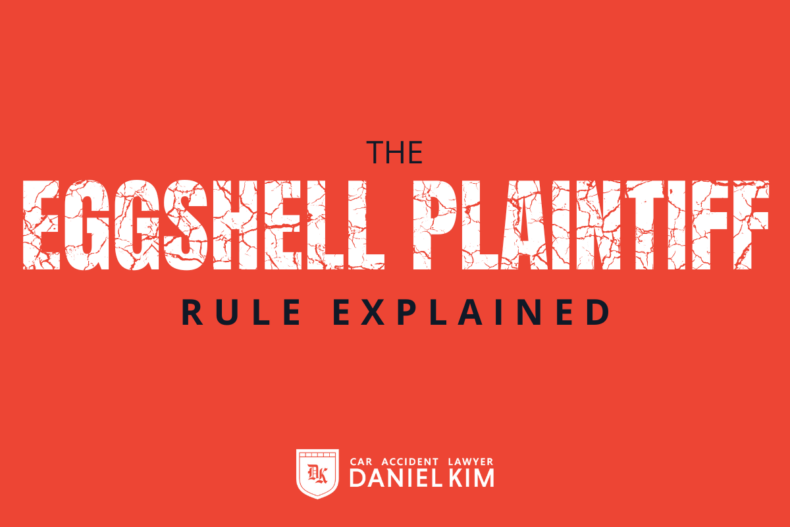What Is the Eggshell Plaintiff Rule?
Also known as the eggshell skull rule or the thin skull rule, the eggshell plaintiff rule is a legal doctrine under tort law. It holds the defendant liable for the plaintiff’s damages, regardless of the plaintiff’s pre-existing condition. Essentially, the defendant must “take their victim as they find them.”
If you have questions regarding whether the eggshell skull rule applies to your personal injury case, speak with an experienced personal injury attorney as soon as possible. A lawyer can explain your options in a completely free consultation.
START YOUR FREE CONSULTATION
The Meaning of the Eggshell Skull Rule
In the context of personal injury law, the eggshell skull rule ensures that a defendant (the person being sued) cannot escape liability for exacerbating a pre-existing condition due to their negligence.
The eggshell skull doctrine is named after a hypothetical situation where a person with a fragile skull, akin to an eggshell, suffers a head injury. If the victim’s skull fractures more easily than the average person, the defendant is still fully liable for all resulting damages, despite the victim’s unusual vulnerability.
Despite its name, the eggshell skull rule applies to all types of injuries, including physical, emotional, and psychological harm.
What Is a Pre-Existing Injury?
A pre-existing injury or condition is any health issue a person has before an accident. Common types of pre-existing conditions that relate to a personal injury case may include:
- An injury in the process of healing but unrelated to the current accident
- Chronic pain that existed before the accident
- A permanent disability or chronic illness from a prior condition or accident
- Mental health issues from another illness or injury
How Does This Rule Apply to Personal Injury Cases?
When a person is injured due to the negligence of another person, they should be entitled to the full spectrum of damages available to them. The eggshell plaintiff doctrine protects this right by mandating that the negligent party is liable for the full extent of a plaintiff’s damages, regardless of any pre-existing conditions.
If a defense attorney tries to argue that your injury was not accident-related but rather a pre-existing injury, you can counter their argument by invoking the eggshell skull rule. An experienced personal injury lawyer can defend you against these accusations and ensure you receive maximum compensation while holding the defendant responsible.
Does the Eggshell Plaintiff Rule Apply to Emotional Injuries?
The eggshell plaintiff rule does not only apply to physical injuries – it also extends to emotional and psychological trauma. Serious accidents like motor vehicle accidents can cause immense emotional distress and post-traumatic stress disorder (PTSD). The eggshell rule acknowledges that individuals with pre-existing mental health conditions may suffer exacerbated emotional distress following an accident.
For instance, a car accident victim already struggling with anxiety could experience heightened anxiety levels or other psychological effects post-accident. This rule ensures that such individuals are not denied just compensation due to their pre-existing condition.
Get Help Recovering the Maximum Compensation
Dealing with medical expenses from a pre-existing condition is already challenging; adding the financial strain of injuries sustained in a car accident can significantly heighten your stress levels. If you are in this predicament, you should reach out to an experienced personal injury lawyer as soon as possible.
With a lawyer on your side, you have the best chance at recovering the maximum amount of compensation for your economic and non-economic damages.
Economic damages refer to actual financial losses incurred due to the accident. They include the following:
- Medical expenses: Past and future medical treatment, physical therapy, medication, surgery, and rehabilitation.
- Lost income: If the injured victim is unable to work due to their injury, their settlement can include compensation for their lost wages.
- Property damage: A personal injury settlement can cover the cost of the repair or replacement of the injured victim’s vehicle or any other personal property damaged in the accident.
Non-economic damages represent the intangible losses suffered by the victim. The eggshell skull rule allows a person to recover these damages, which include:
- Pain and suffering: Injured victims can recover compensation for their physical and emotional pain caused by the defendant’s negligence.
- Loss of enjoyment of life: An injured plaintiff can claim loss of enjoyment if they can prove they no longer do the things they love because of the injury.
- Emotional distress: Also known as mental suffering, emotional distress encompasses various causes and symptoms, including depression, anxiety, and insomnia.
Talk to a Personal Injury Lawyer Today
If you’re dealing with the aftermath of an accident and have pre-existing conditions, the first thing you should do is seek medical treatment. Your health and well-being should be your top priority. Secondly, you should reach out to a lawyer.
Dealing with the insurance company insurance claims process can be incredibly frustrating. A qualified lawyer with a track record of success can help you obtain damages that were caused by the defendant’s actions.
During a free consultation, our personal injury attorney can discuss how the eggshell thin skull rule may apply to your case and help you understand your legal rights and options. Contact The Law Offices of Daniel Kim today to set up your free case evaluation.


